ECONOMY 10 – NO POOR, NO NATIONAL DEBT & BONDED LABOR
No one in need? Deuteronomy 15:4, 15:11
“4 … there will be no one in need among you … 11 there will never cease to be some in need on the earth”
How do we make sense of this? Isn’t this a straight contradiction? Does God contradict himself? And in the same chapter?
- Some say: This is a moral imperative and ‘there will not be’ means ‘there should not be’. ‘No poor’ is a goal to work towards, but it’s never attainable.’
- This is reasonable, but it does raise another questions: Are God’s laws ‘illusionary unreachable ideals’ only? So how can they be binding? How can there be accountability? How can God judge?
- Some say: This is a promise. A conditional promise. > If only you did obey the entire law this would be the case … and no society ever did … therefore there are always poor remaining.
- Another way to make sense of this: When we hear ‘there will never cease to be some in need” we translate this in our minds to mean “the poor always remain poor”. In other words we think of poverty as permanent.
- Maybe God meant to say: Misfortune is real and might strike anybody at any time and there will always some that are falling into poverty (Example: a natural disaster, a harvest being attacked by a pest, a poultry farm attacked by a disease, a bread-winning husband experiencing a work accident, a break-in and theft, a house burning down).
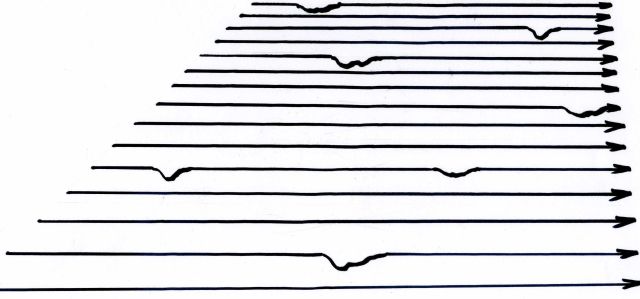
- But: nobody is meant to stay is poverty. They are meant to be so supported that they are able to recover withing a few years.
- So there will always be someone stricken by a misfortune (“there will never cease to be some in need”), but nobody should remain poor (“there will be no one in need among you”). You are meant to recover.
- You are meant to be supported. God’s word is meant to produce a helping attitude is those around you and a principle framework by which this help is administered.
- This is expressed in solidarity funds and is the basis of the original idea behind insurances (though their current philosophy is different).
- Illustration: several families in a village over time (see picture on the left)
Ability to loan to others Deuteronomy 15:4-6
“There will, however, be no one in need among you, because the LORD is sure to bless you in the land that the LORD your God is giving you as a possession to occupy. 5 If only you will obey the LORD your God by diligently observing the entire commandment that I command you today. 6 When the LORD your God has blessed you, as he promised you, you will lend to many nations but you will not borrow; you will rule over the nations but they will not rule over you.”
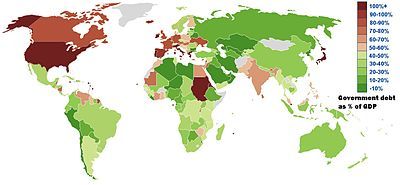
- God promises blessing (including economic blessing), longevity, protection and self-rule to a society that widely obeys his law.
- How does this blessing work?
- > like a reward, a prize, a thing given additionally, like a dessert, a sweet?
- > like a concrete fruit of the obeyed, a built-in consequence, a direct result?
- Wrong behavior automatically leads to loss, destruction, death … not by God punishing it, but by natural consequences … that’s why he forbade it! That is why God is explaining to us how reality works!
- In the same way: Right behavior automatically leads to gain, blessing … not by God adding a ‘stand alone blessing”, but by natural consequences … that’s why God commanded it! That’s why God is explaining to us how reality works!
Don’t take loans Deuteronomy 15:6
“you will lend to many nations but you will not borrow; you will rule over the nations but they will not rule over you.”
- Obedience to God’s law will result in economic strength (personally & nationally)
- > but fruit takes time to grow > for a time things may ‘look different’
- > maybe obedience, but economy only slowly building up (Caretaker Gov’t 08)
- > maybe economic strength, but only as a left-over blessing (The West)
- Modern day reality: We do the exact opposite: Most nations have horrendous and growing debts, even the very comparatively affluent nations!
- > We have no serious plan or commitment to stop this!
- > As little as 60 years ago most nations were debt free!
- > over the last 2 generations we have spent the money of 4 generations
- > we are literally spending the money of our children and grand children!
- > somebody will pay the bill …in inflation, environment destruction, instability
- > this is madness!
- The left chart shows the general increase of absolute debt of the US in the last 100 years. The second chart shows the dept as a percentage of GNP. It also shows one of the major reasons for debt: war (1919, 1941-45) and the other: welfare (2010ff).
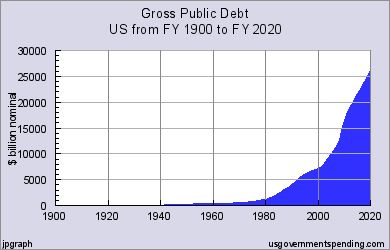
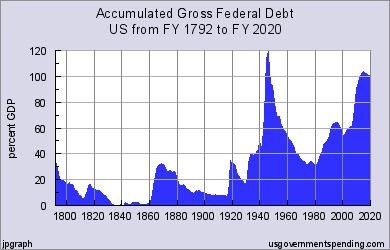
- What does God want to achieve with the command: ‘No national debt’?
- What does it do to a nation if the ‘escape’ of borrowing is not allowed?
- > it forces a nation to look inward, look to its own resources / abilities
- > encouragement to work, create, develop, invent … to live within means
- > Example: Gandhi’s “Buy India!” … When Indians responded and stopped buying foreign-made goods India’s own manufacturing industries came up. First maybe with lesser quality, but constantly improving. Now there are virtually no goods in this world that India does not produce. Looking inward led to a creative surge.
- The chart on the left below shows Switzerland, trying to reduce the debt to GDP ratio, which is good – yet still: debt is 35% of GNP, and that of a nation considered ‘rich’!
- The chart on the right below shows Greece, charting Government Debts against GDP.
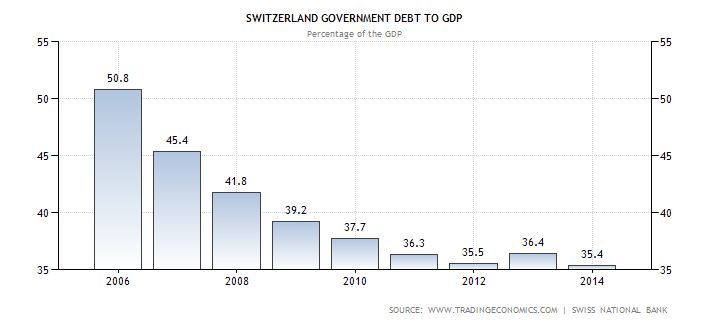
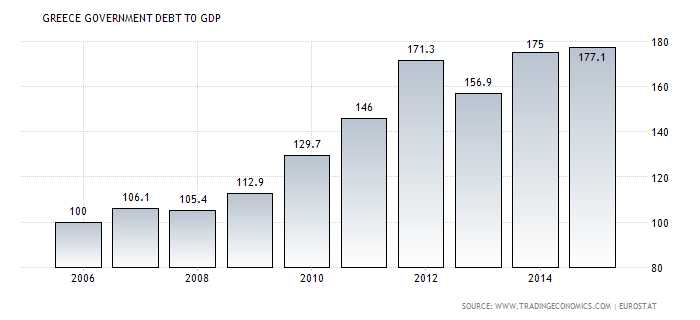
- Borrowing is discouraged, lending is permissible … is this not a double standard?
- God does not want dependency of nations or slavery of any kind
- Or is this simply a description of reality?
- > economic strength will make you influential, whether you want it or not
- Maybe this is not only a bad thing?
- > economic strength of a country will export its principles
- > strength ⇔ influence ⇔ leadership ⇔ principles exported
- Example: Israel’s calling … though not achieved:
- > model nation so lawful > in such good state > nations drawn to it
- > Israel as model of what God will do for any nation
Bonded Labor
Deuteronomy 15:12-18
“If a member of your community whether a Hebrew man or a Hebrew woman is sold to you and works for you six years, in the seventh year you shall set that person free. 13 And when you send a male slave out from you a free person, you shall not send him out empty-handed. 14 Provide for him liberally out of your flock, your threshing floor, and your wine press, thus giving to him some of he bounty with which the LORD your God has blessed you. 15 Remember that you were a slave in the land of Egypt, and the LORD you God redeemed you; for this reason I lay this command upon you today. 16 But if he says t you, “I will not go out from you,” because he loved you and your household, since he is well off with you, 17 then you shall take an awl and thrust if through his earlobe into the door; and he shall be your slave forever. You shall do the same with regard to your female slave.18 Do not consider it a hardship when you send them out from you free persons, because for six years they have given you service worth the wages of hired laborers; and the LORD your God will bless you in all that you do.
- System of bonded labor, non-permanent slavery, voluntary servitude.
- > If you fall into poverty for whatever reason
- > The one you owe money to sells you into bonded labor
- > option to put yourself into bonded labor
- Bonded labor?
- > Laborer serves his temporary owner
- > The owner takes care of laborer’s family, food, shelter, security
- > Every 7th year (Sabbath year proclamation) all bonded laborers released
- > payment, in food, drink, herd, flock, grain…
- What does God want by bonded labor?
- > chance of a new beginning after financial disaster
- > creating new basis of future life
- > create a way to survive and to sustain one’s family after a disaster
- > working directly under a successful person
- > learning on the job how to run a farm / business successfully
- > training in hard work / discipline / apprenticeship / training for future
- Generous payment to male and female laborers
- > gender equality in wages
- Option to make the bonded labor permanent if the laborer wants > awl
- > bonded labor was not meant to be exploitation
- > but joining of households (one weak, one strong)
- > expectation of this being a good thing > option of permanency
- Modern day slavery seeks to prevent a laborer to become independent, self-sustaining or free, rather poverty & bondage is perpetuated and hope crushed.